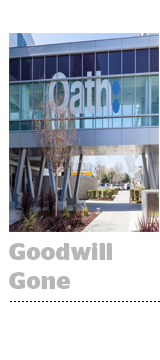Verizon will take a $4.6 billion goodwill impairment charge in the fourth quarter, acknowledging that its Oath business unit has underperformed, the company said Tuesday. The hit nearly eliminates the $4.8 billion goodwill balance Verizon carried after it acquired and merged Yahoo and AOL and assorted technology holdings into its Oath business unit back in 2015 and 2016.
The future looked bright in those early years, but reality got in the way. Among the challenges: Oath did not enjoy the hoped for access to Verizon’s powerful data, Verizon’s refocus on 5G (and away from media) and organizational friction appeared to restrain Oath CEO Tim Armstrong from executing on his vision to take on the Facebook-Google advertising duopoly.
Then came a string of executive exits at all levels of the company, culminating in the departures of Armstrong and Verizon CEO Lowell McAdam.
Incoming Verizon CEO Hans Vestberg made the decision to write down Oath’s value after conducting a five-year strategic planning review.
“Verizon’s media business, branded Oath, has experienced increased competitive and market pressures throughout 2018 that have resulted in lower than expected revenues and earnings,” Verizon said in a SEC 8-K filing dated Dec. 11. “These pressures are expected to continue and have resulted in a loss of market positioning to our competitors in the digital advertising business.”
Oath, and more broadly, Verizon, has had a tumultuous year. Oath reported in October its Q3 revenue was down 6.9% YOY to $1.8 billion. Verizon also sunsetted its content app, go90, back in June.
Verizon added in the SEC filing that 10,400 of its employees have accepted a voluntary buyout. These employees have until June 2019 to formally exit the company, with about half of them leaving this month.













